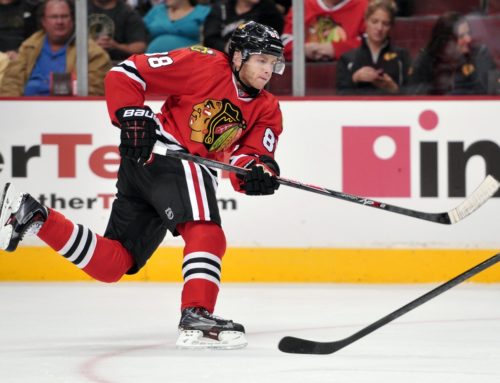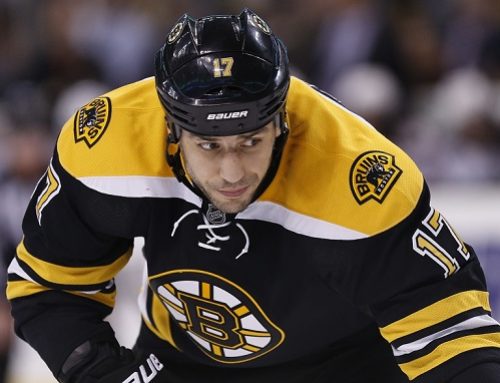Who doesn't love Olympic hockey? Besides the NHLPA, most of us who call ourselves hockey fans love cheering on our countries in international tournaments…and this one is the biggie.
Yet, it's been repeatedly argued that Olympic hockey affects the NHL season.
Recently, Sam Fels at Second City Hockey argued that the both the powerhouse Detroit Red Wings and Ottawa Senators of the 2005-06 season were punted in the first round of the playoffs due to the fatigue of their Olympian-heavy rosters, never mind the crushing Dominik Hasek injury during the Torino tournament. And Terry Frei of ESPN, points out several other interesting NHL trends during Olympic years.
These tidbits caught my attention, and while the specifics of the so-called 'Olympic effect' are somewhat unclear, make no mistake, all of our fantasy teams will have players that will be part of the frenetic two-week Olympic orgasm. We'll also all have players that will receive an unusually long break. We will all be affected.
So with an eye to this year's fantasy hockey season, I investigated a very simple question: are the top-30 scorers (most of whom I figured would likely be part of their countries' national teams) affected by the Olympics?
I expected to find nothing. I was wrong.
Reduced Scoring in 2009-10?
There have been three Winter Olympic Games involving NHL players to look at: 1998, 2002, and 2006.
I compared the average points of the top-30 scorers in the three Olympic years with the previous and following seasons in an attempt to detect an Olympic effect.
After running the numbers surrounding the 1997-98 season, I was startled to see that there was a marked decline in average scoring. The top-30 scorers scored almost 10 fewer points in the Olympic season than in the season previous. Interestingly, there was a six-point rebound the next season.
The numbers were even more dramatic for the 2001-02 campaign. There was an eleven-point decline in average scoring amongst the top-30 scorers from the previous season, followed by an eight-point rebound!
Just as I was starting to get worried about this season's unavoidable scoring melt-down, the 2005-06 season broke the trend.
While there was no season prior to the Torino Olympics due to the 2004-05 lockout, there was virtually no difference between the top-30 scorers' average points in the following season.
|
|
Previous Season Points (average of top 30 scorers) |
Olympic Year Points (average of top 30 scorers) |
Following Year Points (average of top 30 scorers) |
|
1998 Olympics |
86.27 |
76.43 |
80.70 |
|
2002 Olympics |
86.43 |
74.90 |
82.57 |
|
2006 Olympics
📢 advertisement:
|
n/a (lockout) |
91.57 |
91.00 |
Comparison of the average points of the top-30 scorers I three Olympic years
Despite the inconsistency of the 2005-06 season, I had to admit that there just might be an Olympic effect when it came to our beloved big-guns and their annual scoring sprees.
Much has made of fatigue in Olympic years, so I wondered: were the top-30 scorers playing fewer games due to injury or fatigue?
Nope. When you look at the average number of games played by the top-30 scorers in a year, there is virtually no difference when comparing an Olympic seasons with the previous and following seasons. And in all three years, Olympians dominated the top-30 scoring list.
Alright, I thought, let's flip this around. Did the non-Olympians do more scoring than normal in Olympics years?
Not really. In 1997-98, there were 12 non-Olympians on the top-30 scoring list. One made the list both in the previous and the following seasons (ah, we miss you, Pierre Turgeon), while five made the list only in the previous season, and four made the list only in the following season. Only two non-Olympians failed to make the top-30 scoring list in either the previous season or the season following the Olympic year.
In 2001-02, there were 14 non-Olympians on the top-30 scoring list. None of these skaters made the list in both the previous and following season. Three made the list the previous year, and three made the list the following year. Only five didn't make either list.
In 2005-06, there were only nine non-Olympians on the top-thirty scoring list. While there was no previous season due to the lockout, in the following season four reclaimed their spots, while the other five fell off the list.
Your Fantasy Take-Aways
After all my late-night reading and nerdy number-crunching, here's what you need to know for your fantasy season:
1. We might once again see a noticeable dip in average scoring by the league's best scorers, but Olympians will dominate the top-30 scoring list. Olympic participation will not keep the best scorers from out-performing their peers. The Olympics should not change your plans for the first few rounds of your draft.
2. Very few non-Olympic players who crack the top-30 scoring list in an Olympic year do not do so in either the season prior to or directly following it. There isn't any more turn-over in the top-30 names than you would expect in any other year. Maybe you'll be lucky enough to grab one of these skaters, but don't go out of your way to draft players who aren't going to Vancouver in February on behalf of their countries.
3. Injury to Olympic participants is a possibility, but it's a smaller concern then the NHLPA would have you believe. Don't pass up Mr. Iginla because he's going to Vancouver in February.
4. There is some anecdotal evidence to suggest that there is a fatigue factor in Olympic years that shows up in the playoffs. But worry about that in your playoff pool.
Now you know something about the 'Olympic effect'. It might very well exist, but there's no need to panic.
So what are you waiting for? Throw on your nation's sweater and go show off your new hockey knowledge to you friends, already.






 PHI
PHI ANA
ANA VAN
VAN DET
DET BUF
BUF NYR
NYR MIN
MIN S.J
S.J
